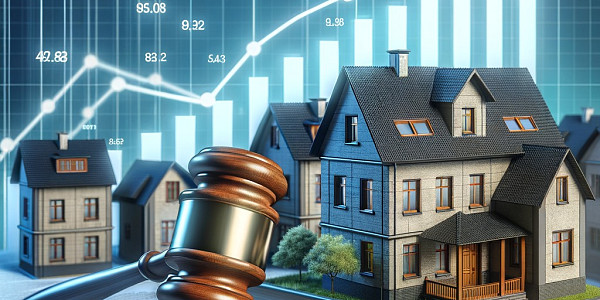
The German rental market in 2025 — new challenges and opportunities
Germany is one of the few European countries where renting traditionally prevails over owning property. According to the statistical office, more than half of German families rent apartments and houses. However, in 2025, the usual way of life of the rental market is undergoing a large-scale transformation under the influence of economic, social and environmental factors. Global inflation, the energy crisis, tightening energy efficiency standards, an acute shortage of housing in large cities and an influx of immigrants are just some of the challenges that tenants and landlords face. At the same time, the state is introducing new support and regulation measures designed to make renting more affordable and fair.
Key trends in the rental market in 2025
- Growing demand and prices against the backdrop of a supply shortage — despite the government's ambitious plans to build 400,000 new homes annually, the actual volume of housing commissioning is lagging significantly. According to experts, only about 250,000 units will be built in 2025 — a drop in the ocean for the country's growing population. The main reasons for the shortage are a shortage of land, rising prices for building materials and labor, and bureaucratic barriers. As a result, competition for affordable housing is intensifying, especially in major cities like Berlin, Munich, and Hamburg, which are attracting more and more students, young professionals, and immigrants. A logical consequence is an increase in rental rates. According to Statista, over the past year, the average rental price in Germany has increased by 6.38% and reached 13.55 euros per square meter. In premium locations, rates are already exceeding 20 euros per square meter, while in smaller cities you can still find options for less than 10 euros. However, the trend is clear — renting housing is becoming more and more expensive.
- New requirements for energy efficiency of housing — one of the main priorities of German housing policy is energy efficiency and decarbonization of buildings. From 2025, all new homes will have to meet the Energy Efficient Home 55 (EH55) standard, which is 15% higher than the previous standard. This means using better insulation, renewable energy, and smart climate control systems. In addition, the rules for existing housing are being tightened. Many landlords will have to invest in upgrading their properties — replacing outdated boilers and radiators, insulating facades and roofs, installing solar panels and heat pumps. In the short term, this may lead to higher rents, but in the long term, it will save on heating and electricity costs.
- Expanding social housing and subsidy programs — to offset the rising cost of housing for low-income families, the government is expanding social support programs. From 2025, households with an income of up to 35% of the national average will be able to apply for housing subsidies (the threshold is currently 25%). In addition, living space standards for benefit recipients are increasing. At the same time, the state is stimulating the construction of affordable rental housing. Developers building social apartments receive tax breaks and subsidies. And the period during which such apartments must be rented out at reduced rates has been increased from 15 to 20-30 years. The goal is to increase the share of social housing to 30% in new projects.
- Cancellation of the fee for registration of a lease agreement — from 2025, it is planned to cancel the controversial fee for registration and renewal of a lease agreement (Mietvertragsgebühr). Previously, it amounted to 2-3 monthly rents and fell on the shoulders of tenants. Now these costs will be borne only by landlords. This decision is intended to reduce the financial burden on tenants and stimulate mobility in the housing market. However, it is still being discussed at the federal level and has not yet been enshrined in law.
Prices and regional differences
The level of rental rates and the cost of purchasing housing vary significantly from region to region. The most expensive cities for rent are Munich (19-21 euros per square meter), Frankfurt and Stuttgart (15-19 euros). For comparison, in Wuppertal and Duisburg you can rent an apartment for 7-11 euros per square meter. The range of purchase prices is even greater. The average cost per square meter in Munich is over 7,000 euros, in Hamburg — 4,600 euros, and in smaller cities like Bremen or Leipzig — 2,500-3,500 euros. Such differences are explained not only by the economic status and prestige of the location, but also by local market characteristics. In some places, municipalities are actively building social housing and restraining the appetites of investors, while in others the market is freer. Therefore, it is important for tenants and buyers to study the situation in a particular city or region.
Expert forecasts and recommendations
Most analysts agree that in the coming years, the rental market in Germany will continue to grow at a moderate pace — by 2-4% per year. The picture will not change fundamentally: in top cities and locations, prices will be high, and competition for good options will be intense. In small towns and suburbs of megacities, you can still find affordable offers.
Experts and specialists recommend tenants:
- Start searching in advance, at least 2-3 months before the desired moving date. Good options are taken very quickly.
- Prepare all the necessary documents (income certificates, recommendations from previous places, bank statements). Many landlords prefer tenants with a full package of papers.
- Be prepared to compromise on price, area or location. In conditions of shortage, the choice is limited.
- Follow market news and changes in legislation — they can open up new opportunities (for example, for receiving subsidies).
Experts advise landlords to:
- Upgrade their properties in a timely manner in accordance with new energy standards. The sooner you do this, the more you will save in the future.
- Do not raise rental rates above the market level. In the long term, this may lead to long-term downtime of apartments and losses.
- Offer tenants long-term contracts for 3-5-10 years. This will reduce tenant turnover and provide a stable income.
- Consider the option of renting out some apartments under social programs — this provides tax benefits and guaranteed demand.
To summarize, we note that 2025 is becoming a turning point for the rental market in Germany. The state is tightening environmental requirements, expanding social guarantees, and changing the rules of the game. Developers and landlords are forced to adapt to new realities and invest in modernizing properties. Tenants receive more protection and support, but still have difficulty finding affordable options. The main conclusion is that the rental market in Germany is becoming increasingly regulated, technologically advanced and focused on long-term sustainability. This opens up new opportunities, but also creates new challenges. To stay on top, both tenants and landlords need to keep their finger on the pulse, calculate risks, invest in knowledge and quality relationships with each other. After all, the future of the rental market and the millions of people who call a rented apartment their home depends on their effective interaction.
 6
6
 25.1
25.1  1
1  1
1  1
1  2
2  15
15
 18
18
 4
4
Install our app and get all the tools you need to search for real estate abroad in your smartphone! The mobile application will allow you to quickly access your personal account, manage your favorite properties and track your requests, directly exchange messages with sellers and buyers.


In 2025, the rental market in Germany is undergoing major changes. Tightening energy efficiency requirements, a reform of the social benefits system, the possible abolition of controversial fees and growing demand against a backdrop of limited supply are all creating a new reality for tenants and landlords. We look at the causes, consequences and prospects for these changes.

Albania is experiencing an unprecedented tourism boom that is not only attracting record numbers of foreign visitors, but also stimulating the rental market and generating significant revenue for the government. The increase in tourism is transforming the country’s economy and creating new opportunities for both locals and foreign investors.

In Germany, the new government has announced major changes to migration policy. The accelerated scheme for obtaining citizenship in 3 years is cancelled, restrictions on family reunification and the acceptance of refugees are introduced, and border controls are tightened. We talk about the essence of the reforms, their reasons and impact on migrants and German society.
























